Garden Maintenance in Blackheath
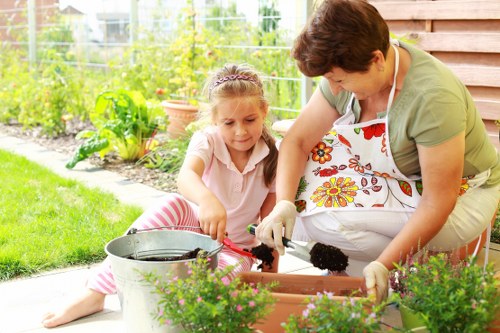
Introduction to Garden Maintenance
Maintaining a beautiful garden in Blackheath requires a blend of expertise and dedication. Whether you're a seasoned gardener or a novice, understanding the unique aspects of Blackheath's climate and soil conditions is essential for cultivating a thriving outdoor space.
Proper garden maintenance not only enhances the aesthetic appeal of your home but also contributes to the overall health of your plants. From regular pruning to seasonal planting, each task plays a crucial role in sustaining a vibrant garden.
In this guide, we will explore the key components of effective garden maintenance in Blackheath, providing you with the insights and tips needed to keep your garden looking its best all year round.
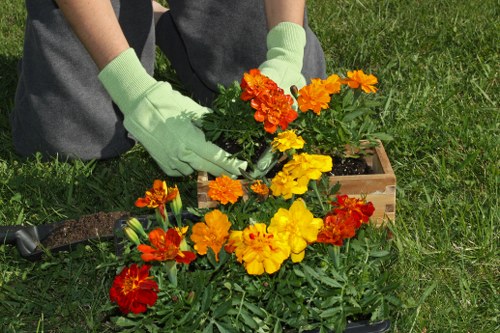
Understanding Blackheath's Climate
The climate in Blackheath is characterized by mild winters and warm summers, creating a favorable environment for a diverse range of plants. However, understanding the specific climate patterns is vital for selecting the right plants and scheduling maintenance tasks effectively.
Blackheath receives moderate rainfall throughout the year, which influences watering schedules and soil drainage practices. Implementing appropriate irrigation systems can help in maintaining optimal moisture levels, ensuring that your plants receive the necessary hydration without the risk of waterlogging.
Additionally, the region's relatively stable temperatures reduce the likelihood of frost damage, allowing for a wider variety of plants to thrive. Nevertheless, being prepared for occasional temperature fluctuations is crucial for protecting sensitive species.
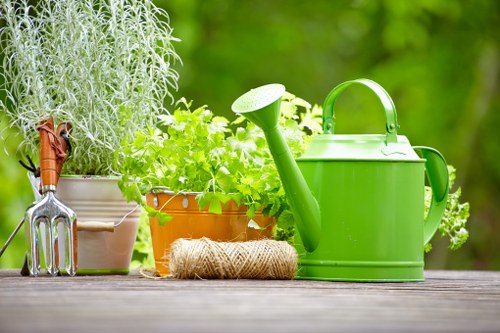
Essential Garden Maintenance Tasks
Pruning and Trimming
Regular pruning encourages healthy growth and enhances the overall shape of your plants. It is important to remove dead or diseased branches to prevent the spread of pests and diseases.
Tools for Effective Pruning
Having the right tools is essential for precise and efficient pruning. Invest in high-quality pruning shears, loppers, and saws to tackle different types of branches.
Pruning Techniques
Employing proper pruning techniques, such as clean cuts and avoiding over-pruning, ensures the longevity and health of your plants.
- Remove any crossing branches to improve air circulation.
- Shape plants to maintain their desired form.
- Cut back overgrown areas to promote new growth.
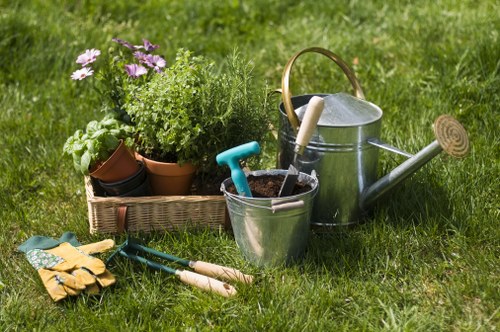
Soil Care and Fertilization
Healthy soil is the foundation of a thriving garden. Regular soil testing can help determine nutrient deficiencies and pH imbalances, allowing you to amend the soil appropriately.
Incorporating organic matter, such as compost or well-rotted manure, enhances soil structure and fertility. This not only provides essential nutrients but also improves water retention and drainage.
Fertilization should be done in accordance with the specific needs of your plants. Over-fertilizing can lead to excessive growth and make plants susceptible to diseases, while under-fertilizing may result in poor plant performance.
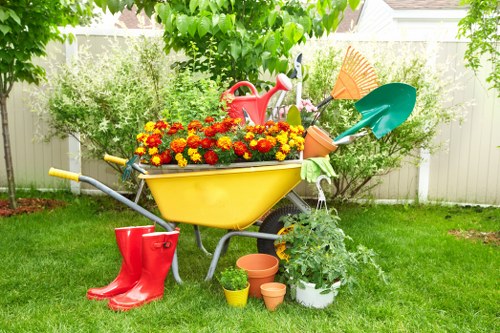
Pest and Disease Management
Keeping pests and diseases at bay is crucial for maintaining a healthy garden. Regular monitoring and early detection can prevent minor issues from escalating into major problems.
Integrated Pest Management (IPM) is an effective approach that combines biological, cultural, and chemical methods to control pests with minimal impact on the environment.
- Biological Control: Introducing beneficial insects that naturally prey on common garden pests.
- Cultural Practices: Crop rotation and proper spacing to reduce pest habitats.
- Chemical Control: Using pesticides as a last resort, ensuring they are environmentally friendly and targeted.
Regularly inspecting plants for signs of pests or diseases and taking immediate action can significantly reduce their impact on your garden.
Seasonal Garden Maintenance
Spring Maintenance
Spring is an ideal time to prepare your garden for the growing season. Start by cleaning up any debris left over from winter, such as fallen branches and dead leaves.
Planting new flowers and vegetables, pruning overgrown shrubs, and setting up supports for climbing plants are key tasks during this season.
Additionally, applying a balanced fertilizer can give your plants the nutrients they need to flourish.
- Start seedlings indoors to get a head start on the season.
- Mulch garden beds to retain moisture and suppress weeds.
- Check and repair irrigation systems for optimal performance.
Summer Maintenance
Summer maintenance focuses on watering, weeding, and protecting plants from the heat. Consistent watering schedules are essential, especially during dry spells.
Deadheading spent flowers encourages continuous blooming and keeps the garden looking tidy.
Implementing shade solutions, such as shade cloths or strategic planting, can help protect sensitive plants from intense sunlight.
Choosing the Right Plants for Blackheath
Selecting plants that are well-suited to Blackheath’s climate and soil conditions is fundamental to successful garden maintenance. Native plants often require less maintenance and are more resilient against local pests and diseases.
Consider incorporating a mix of perennials, annuals, shrubs, and trees to ensure year-round interest and biodiversity in your garden.
- Perennials: Provide long-lasting beauty with minimal upkeep.
- Annuals: Offer vibrant color and can be rotated seasonally.
- Shrubs and Trees: Add structure and provide habitat for wildlife.
Consulting with local garden centers or horticulturists can help you make informed choices about the best plants for your specific garden conditions.
Watering Strategies for a Healthy Garden
Efficient watering is critical for plant health and water conservation. Understanding the specific watering needs of different plants ensures they receive adequate moisture without wastage.
Implementing drip irrigation systems can deliver water directly to the plant roots, minimizing evaporation and runoff. This method is particularly effective in Blackheath’s climate, where consistent moisture levels are beneficial.
Additionally, watering in the early morning reduces the risk of fungal diseases and allows plants to absorb moisture before the heat of the day.
- Assess the soil moisture regularly to adjust watering schedules.
- Use mulch to retain soil moisture and regulate temperature.
- Choose drought-resistant plants to reduce overall water requirements.
Lawn Care and Maintenance
A well-maintained lawn forms the foundation of any garden. Regular mowing, aeration, and fertilization keep the grass healthy and resilient.
Choosing the right grass type for Blackheath’s climate, such as perennial ryegrass or fescue, ensures better growth and durability.
Implementing sustainable practices, like reducing herbicide use and encouraging natural grass growth, promotes an eco-friendly garden.
Hardscaping and Garden Structures
Incorporating hardscaping elements like pathways, patios, and garden walls enhances the functionality and aesthetic appeal of your garden.
Proper maintenance of these structures, including regular cleaning and repairs, ensures their longevity and safety.
Integrating garden furniture and decorative elements can create inviting spaces for relaxation and entertainment.
- Use natural stone or brick for durable and attractive pathways.
- Incorporate pergolas or gazebos to provide shade and structure.
- Maintain garden lighting to highlight key features and ensure safety at night.
Eco-Friendly Garden Practices
Adopting sustainable gardening practices not only benefits the environment but also enhances the health of your garden. Reducing chemical use, conserving water, and promoting biodiversity are key aspects of eco-friendly maintenance.
Composting organic waste recycles nutrients back into the soil, reducing the need for synthetic fertilizers.
Encouraging pollinators, such as bees and butterflies, by planting native flowers supports local ecosystems and improves plant pollination.
Hiring Professional Garden Maintenance Services
While DIY garden maintenance is rewarding, hiring professional services in Blackheath can save time and ensure high-quality results. Professional gardeners bring expertise and specialized tools to handle complex tasks efficiently.
Services typically include regular lawn care, pruning, soil management, pest control, and seasonal planting. They can also offer personalized advice tailored to your garden’s specific needs.
Investing in professional maintenance can enhance the beauty and value of your property, allowing you to enjoy a stunning garden without the hassle.
Conclusion
Effective garden maintenance in Blackheath involves a comprehensive approach that addresses climate considerations, soil health, plant selection, and sustainable practices. By implementing the strategies outlined in this guide, you can cultivate a garden that is not only beautiful but also resilient and eco-friendly.
Whether you choose to undertake maintenance yourself or enlist the help of professionals, the key is consistency and attention to detail. A well-maintained garden enhances the overall appeal of your home and provides a peaceful retreat for you and your family.
Contact us today to learn more about our garden maintenance services in Blackheath and take the first step towards achieving your dream garden.
